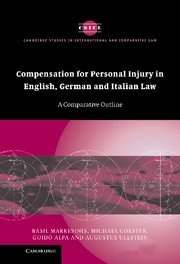Book contents
- Frontmatter
- Contents
- Foreword
- Preface
- Table of cases
- List of Abbreviations
- 1 Introduction
- 2 General damages: non-pecuniary losses
- 3 Special damages: past losses
- 4 Future pecuniary losses
- 5 Collateral sources of revenue: subrogation rights and miscellaneous matters
- 6 Conclusions
- Appendix: Comparative tables on the evaluation of physical injury (IP) for micro-permanent injuries
- Index
- CAMBRIDGE STUDIES IN INTERNATIONAL AND COMPARATIVE LAW
2 - General damages: non-pecuniary losses
Published online by Cambridge University Press: 02 July 2009
- Frontmatter
- Contents
- Foreword
- Preface
- Table of cases
- List of Abbreviations
- 1 Introduction
- 2 General damages: non-pecuniary losses
- 3 Special damages: past losses
- 4 Future pecuniary losses
- 5 Collateral sources of revenue: subrogation rights and miscellaneous matters
- 6 Conclusions
- Appendix: Comparative tables on the evaluation of physical injury (IP) for micro-permanent injuries
- Index
- CAMBRIDGE STUDIES IN INTERNATIONAL AND COMPARATIVE LAW
Summary
English law
Introduction
The guiding principle for the award of damages in respect of a tort is, in English law, to compensate the victim of the wrongdoing. That is as true in cases of personal injury as it is for any other tort. Punitive or exemplary damages may not be awarded for personal injury no matter how severe the injury may be nor how gross the negligence on the part of the wrongdoer. The difference here between English and American law is significant and accounts in large part for the different size of awards found in the two countries.
If, however, injury has been caused by a deliberate act, aggravated damages may be awarded. If the personal injury has been caused by a trespass to the person rather than by negligence, the court has discretion to make such an award. Such cases are rare, and judges have discouraged the pleading of claims as a deliberate tort in an attempt to increase the damages.
There may also be a sound practical reason for framing claims in negligence. A claimant who pleads trespass in the form of assault or battery gives the defendant employer the opportunity to contend that he is not vicariously liable because the deliberate act was outside the scope of his employee's employment. It also gives the insurer standing behind the defendant the opportunity to avoid the policy.
- Type
- Chapter
- Information
- Compensation for Personal Injury in English, German and Italian LawA Comparative Outline, pp. 45 - 96Publisher: Cambridge University PressPrint publication year: 2005



